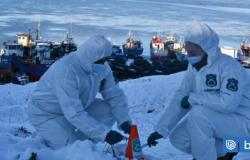
The architect Abel Tablada de la Torre, brother of the deputy director general of the United States Directorate of the Cuban Ministry of Foreign Affairs (MINREX), Johana Tablada de la Torremade a publication on his social networks in which he questioned the information treatment of the official press after the outbreak of violence that occurred last Saturday at Finca de los Monos.
“What is more worrying in a country?” Tablada asked: “That the alternative media give news with false information, or that the official media – which all Cubans pay for – do not give the news on time, no. give them in full when they decide to give them, do not show the images of the facts [y] Don’t interview anyone?”
In an extensive reflection, Tablada de la Torre questioned the official coverage of such serious and worrying events carried out by gangs of young people armed with machetes, and in which at least six people were injured. Your post was shared on the blog Second date of the singer-songwriter Silvio Rodriguez.
Comparing their coverage with that of the independent media, the architect drew the panorama of the media and the formation of public opinion under a totalitarian regime that is beginning to crack, largely due to the informative work of the independent press.
“Journalism in Cuba is shameful, and if it were not for some independent media committed to the truth, there would be no way to find out and understand the reality of the country here”he concluded.
In-depth analysis of censorship in Cuba
But Tablada de la Torre’s criticism penetrated in depth the issue of the Cuban regime’s manipulation and use of information to maintain social control and protect its interests from perpetuating itself in power.
In that sense, he accused them of “publicly blaming those who do not have to blame – always the weakest and never the State”, and of not commenting or reflecting “on the direct and accumulated causes of this type of increasingly common violent phenomena.” in Cuban society and youth.”
Outlining the spirit that underlies the rights to free expression and freedom of the press, Tablada de la Torre did not attack the independent media “and their clear purpose of discrediting everything that is related to the government, blaming it for everything.”
On the contrary, tacitly recognizing that it is the mission of journalism to investigate, question, criticize and denounce the errors, corruption and actions of those who govern, the brother of the MINREX official recognized that independent media fulfill “an important and vacant mission: to inform in time.”
“The official press, which is controlled and represents the Cuban government, does not report in time and when it does it is to deny some incorrect information that the alternative press gave, that is, it acts defensively instead of taking the initiative,” he said. .
Furthermore, he accused the official press of “not carrying out decent, responsible and legitimate journalism when it comes to sensitive issues, since it does not fulfill its function of being the most credible reference for news related to Cuba.”
“To make matters worse, it also manipulates, hides data, images and does not give continuity and depth to facts that merit it… And this has been the case for decades, despite closed and open meetings, congresses with airs of hope, exciting interventions by great or young journalists and some promises from presidents and ideological secretaries,” he added.
Deeply involved in the issue, the architect reproached the official press for not having “the courage and decency to show the images of thousands of Havana residents in front of the Capitol peacefully demanding freedom, of hundreds of Bayamese singing our National Anthem: La Bayamesa, of hundreds of people from Santiago asking for electricity and food.”
“They do not have the courage and decency to question the harsh sentences imposed on many peaceful protesters, those, the majority, who did not overturn cars, did not stone shop windows. “They do not have the courage and decency to follow up on the biggest cases of corruption, some being part of the highest levels of government,” he said.
The brother of the senior official of the Foreign Ministry had more reproaches for the Cuban official media. “They do not have the courage and decency to analyze the causes of inflation, the stagnation of the economy, the share of responsibility of the Cuban system and government in what happens in the country,” he criticized.
“They do not have the courage and decency to ask themselves why, in order to defend themselves from external aggressions and blockades, an internal one must be applied, a false democracy must be proclaimed and applied, the Cuban people must be oppressed in various ways and not seek every possible means.” possible forms of that freedom for which the mambises and the revolutionaries of the 1930s and 1950s fought so hard,” he indicated.
The Tablada de la Torre family: Their contrasts
It is not the first time that the younger brother of Johana Tablada de la Torre uses her social networks to criticize the Cuban regime, a civic attitude that she shares with her mother, the psychologist Carolina de la Torre Molinawho has also shown on several occasions his critical opinion on the Cuban reality.
In September 2022, Tablada de la Torre criticized the shortage of products on offer at the José Martí International Airport in Havana, and referred to the role of airports in shaping the image of the arriving and leaving traveler. , which helps form an idea of how a country works.
“Here in Havana, however, I could not buy a single stick of guava, and it is the only product that my dear cousin who will receive me at her house asked me for. I bought coffee and I could have bought rum and tobacco, but Cuba is not just rum and tobacco, nor is it a cover of a book about Che, Fidel and an American car from the 50s“he stressed.
For her part, their mother has also expressed harsh criticism of the past and present of the Cuban regime. In October 2020, De la Torre Molina criticized a repudiation rally organized by the Cuban State Security against the members of the San Isidro Movement.
“If one day someone sees me in an act of repudiation, shouting and insulting young people who want to peacefully express themselves, don’t even think about it: they will tie me up, disown me back or take me to a mental hospital because I will be out of my mind,” he wrote. on your Facebook wall.
In February 2021, the psychologist criticized the lack of tolerance and space in Cuba for “contrasting thought and debate”.
“There is no space or tolerance for contrasting thought and debate, not even by those who live here with the hope of contributing to a better socialist Cuba. Even anti-imperialist,” de la Torre wrote on Facebook.
The professor questioned the fact that Cuba has only one party (the PCC) that “organizations must follow,” and stressed that the state had put an end to “the tradition of civil societies and even instruction and recreation,” in addition to the free press. “No one can open an opposition blog or register a critical magazine,” she said.
In addition to her outstanding professional career as a university professor, researcher and essayist, De la Torre Molina has dedicated herself to searching for testimonies and studying the life and work of her brother Benjamín, who committed suicide in 1968 after being scarred by the sad homophobic experiences of the Military Production Assistance Units (UMAP). Her story appears in the book. Benjamin. When dying is more sensible than waitingpublished by Verbum publishing house in 2018.





